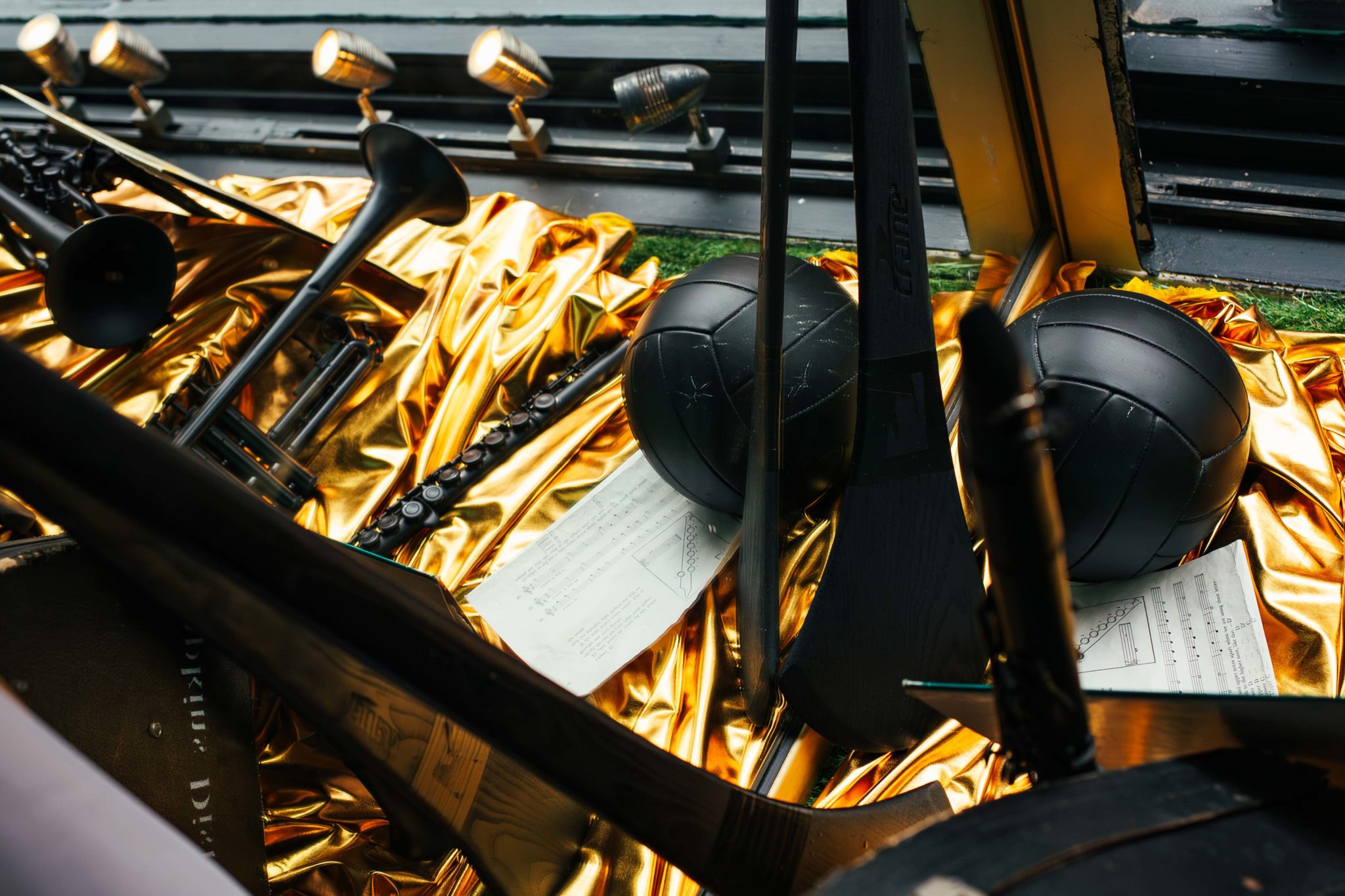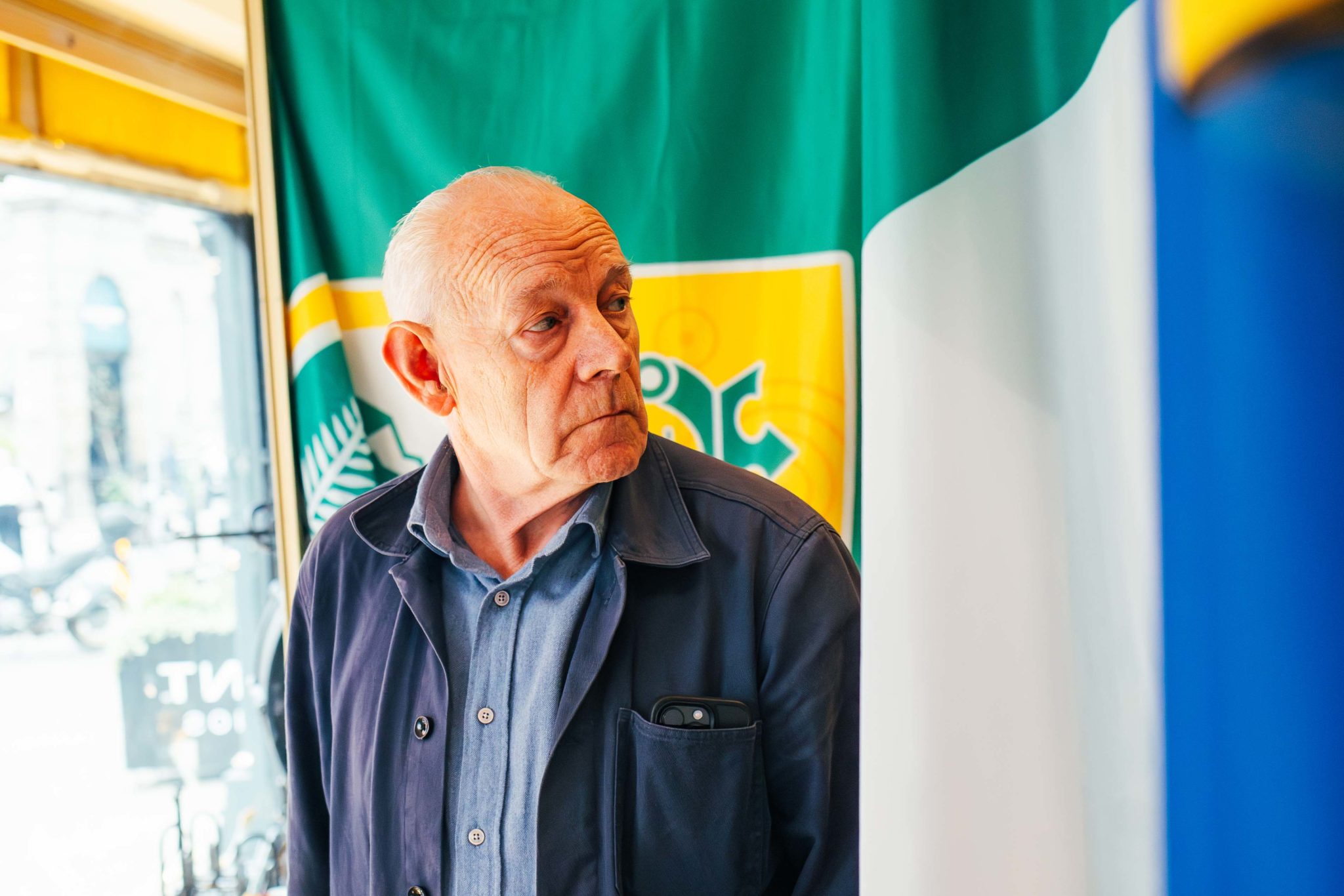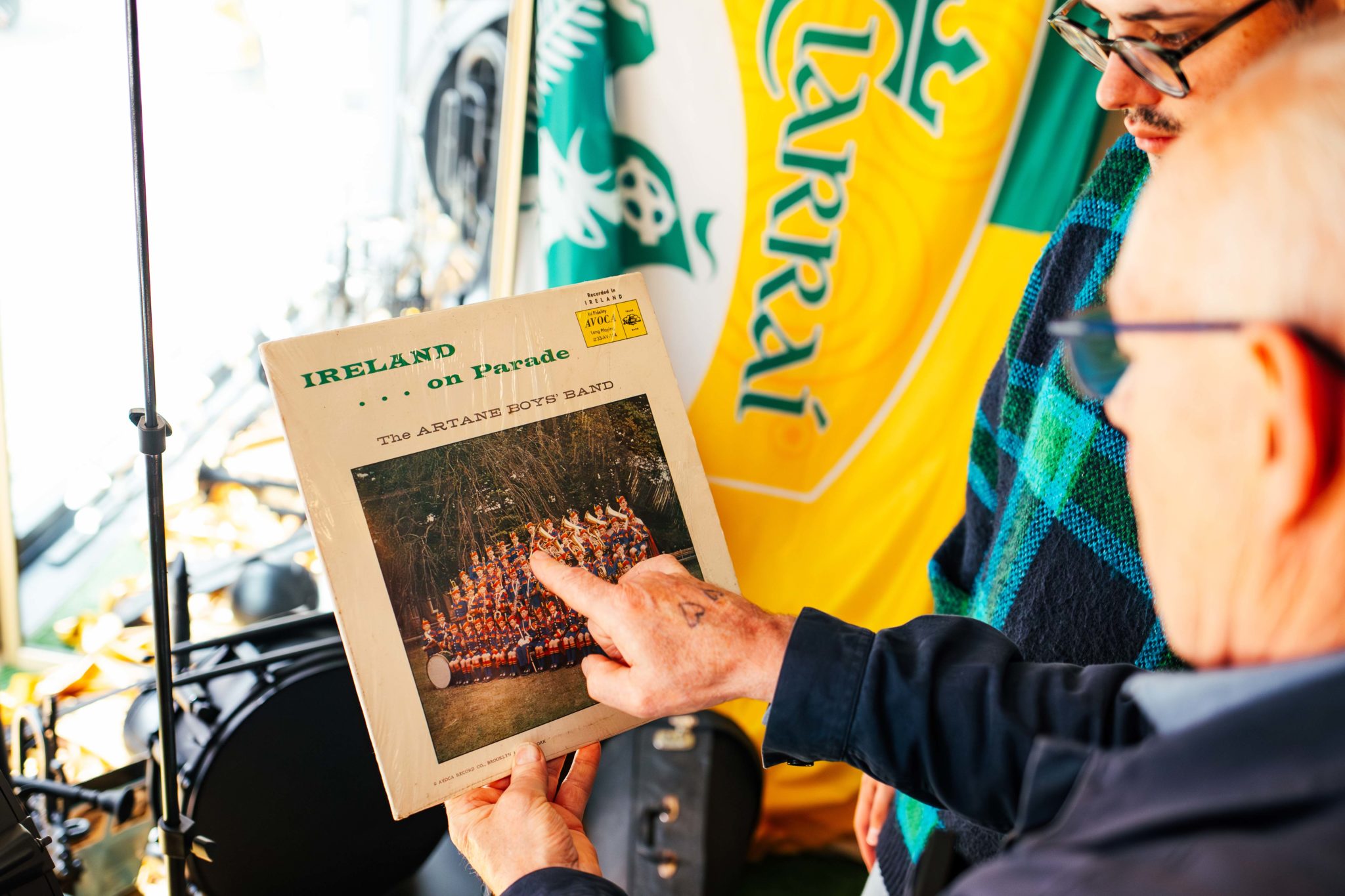- Opinion
- 17 Oct 25
Mannix Flynn on the Artane Band: "In the background there's this darkness"

Artist and Dublin City Councillor Mannix Flynn discusses his exhibition ‘Nobody Could Hear The Music’, which highlights the dark history of the Artane Boys Band amid calls for them to change their name.
The needle drops and the speakers crackle. It’s a ritual that usually promises comfort and escapism.
Except here. As the Artane Boys Band limp through a rendition of ‘Molly Malone’, the battered vinyl spins back to a darker place.
“Singing about cockles and mussels, when the kids in the band were starving,” sighs Independent Dublin City Councillor Mannix Flynn, who leans down and flicks the music off.
We’re standing in an art exhibition, put together in a derelict shopfront on South William Street. Flynn, who assembled the whole thing on his own, doesn’t normally allow people on this side of the glass.
He orders us not to step on the flags, which are twice the height of a person and cost €10,000 to print. There’s one for every county in Ireland, along with the four provinces.
By the window facing the street is a neat display of marching band instruments covered in jet black paint. Passersby stop to examine. A banner spanning the face of this four-storey building tells them, ‘Nobody Could Hear The Music’.
This is about the Artane Band, and the movement to get them to change their name. They originate from the St Joseph’s Industrial School in North Dublin – a site of systemic child abuse, as highlighted in the Ryan Reports. Children in the band were also being exploited. Brother Joseph O’Connor, Band Director until 1975, was a known abuser.
St. Joseph’s closed in 1969, and the music school there today has a positive reputation for fostering and training young musicians, including U2’s Larry Mullen. In 2004, the ‘Boys’ was dropped from the band’s name after girls were allowed to take part.
Still, they continue to play under the Artane Band banner, colours and insignia at national events. Many will be familiar with their pre-match lap of Croke Park. Flynn – himself a victim of abuse in industrial schools – argues that the name and uniform carry an unbearable weight of trauma for survivors.
“It’s this lie that it was all wonderful. That the children were looked after and these kids in the band were not being abused,” he says. “The fact that you wear the uniform is abusive and offensive to us, and traumatic to us. It needs to change. That’s all we’re asking for here.”
 Mannix Flynn at Nobody Could Hear The Music Instillation on South Williams Street on September 5th, 2025. Copyright Abigail Ring/ hotpress.com
Mannix Flynn at Nobody Could Hear The Music Instillation on South Williams Street on September 5th, 2025. Copyright Abigail Ring/ hotpress.comSAME TRAUMA
Flynn spent 20 years in institutions. Much of his time since has been spent campaigning for justice.
“We were beaten up, hit by the police, told we were liars, and eventually they all started to believe us,” he says. “But when you look around, how many people are in jail? None. Do you know why? Because the state indemnified the church.
“I’m almost mad at #MeToo and that whole campaign, that they didn’t connect to this situation. Because what’s the difference between male children and female children being abused by a pedophile? There isn’t any.
“We suffer the same trauma, we go to the same therapy groups, we go through the same situations.”
The Lord Mayor of Dublin withdrew as patron of the Artane School of Music and Artane Band in 2021. Two years later, Dublin city councillors voted in favour of a motion to change the name and uniform. In April last year, Aosdána members also passed a motion calling for a name and uniform change, to recognise “the pain it causes to survivors of abuse and the legacy it continues to carry.”
So far, the Artane School of Music has refused, stating that they were “proud to be a part of the Artane Community.” Others who support keeping the name – including the Survivors of Child Sexual Abuse (SOCA) group – have said that changing it would stigmatise kids currently in the band.
“It’s not a band that was set up in the community of Artane,” Flynn says flatly. “It was born in the institution. With all due respect to those children in that band, someone needs to tell them the truth. You can have all the bands you want, but – in my view – you can’t have the Artane Band. You can’t have the uniform. You can’t have the name and pretend that it’s a great legacy.
“The uniform is offensive. The name is steeped in a horrendous history. We can’t turn on the TV, because we can’t listen to the commentary talking about the glorious history of the Artane band. It’s a lie.
“We’ve written to RTÉ. We’ve told them they can’t put this band out there without saying, ‘Anybody who’s triggered by this needs to get in touch with the Rape Crisis Centre.’ In effect, they told us to fuck off, which is outrageous.
“Any psychiatrist, anybody dealing with trauma, will tell you about the power of this kind of triggering.”
On the window-sill beside the instruments are two hurls propped up on a Gaelic football, also painted black. The Artane Band are synonymous with Croke Park. For Mannix, that makes them a token of historic ties between the GAA, nationalism and the Christian Brothers.
“History was being exploited by the GAA, by the Christian Brothers,” Flynn says. “The children were used to play Fenian songs. This whole thing is put together in a celebratory fashion, but at the centre of that celebration is this darkness. We were in an institution. The children that had to play those instruments were abused, tortured, undermined.
“That uniform and name is soaked in that. Some of those children went to their graves without knowing that they had a family. They were forced to play those instruments. How can the GAA – a national sports organisation that gets vast amounts of money from the State – justify that? It’s not unlike those who were in the Auschwitz band, who were forced to play this music while all around them there was fucking torture, mayhem.”
 Mannix Flynn at Nobody Could Hear The Music Installation on South Williams Street on September 5th, 2025. Copyright Abigail Ring/ hotpress.com
Mannix Flynn at Nobody Could Hear The Music Installation on South Williams Street on September 5th, 2025. Copyright Abigail Ring/ hotpress.comFURTHER COMPARISONS
Flynn makes further comparisons to the statues of slavers that have been torn down across the US and the UK.
“This was a band of slaves,” he says. “They had no choice but to play this music. I want to bring my grandchildren to a GAA game in Croke Park, but I don’t want to have to bring them to a situation where I’m going to have to censor the Artane Band in its present form. I want to be able to bring them and say, ‘This is your culture, this is your history. It’s dark in places, but here’s how we’re dealing with that darkness’.”
The Christian Brothers, he believes, were white-washing their image through music. The Artane Boys Band recorded and released a number of albums.
“They were never paid any royalties,” Flynn explains. “Many of the musicians that came out of the band went into various other bands, but they were all traumatised. Many of them committed suicide, drank themselves, or drugged themselves, to death. Musicians have an obligation to support what we’re trying to do here.”
U2 featured the Artane Boys Band in their video for ‘Sweetest Thing’.
“I’ve known U2 for a long time and I’ve huge respect for them,” he says.
But he wants them to retrospectively remove the band from the video.
“Every time I see the video,” he says, “I go, ‘Oh Jesus here we go again’.”
If that seems like a tall order, he’s disappointed too with the younger wave of Irish artists.
“Musicians, who rightly support the humanitarian situation in Gaza, they’re not opening their mouths here. They’re not saying a word. A reality check is needed. If you’re going to a gig and you’re buying a balaclava for 50 quid to dance around the place, that’s grand. You’re entitled to enjoy yourself, and you’re entitled to help the people in Gaza and other oppressed people. But equally we are oppressed; we are facing a dark symbol that’s hanging over our heads.”
 Mannix Flynn at Nobody Could Hear The Music Installation on South Williams Street on September 5th, 2025. Copyright Abigail Ring/ hotpress.com
Mannix Flynn at Nobody Could Hear The Music Installation on South Williams Street on September 5th, 2025. Copyright Abigail Ring/ hotpress.comPRESIDENTIAL ELECTION
Flynn, meanwhile, is no fan of institutional religion.
“At the centre of all this Catholicism, and this republicanism, is rape, torture, and murder,” Flynn observes bitterly. “And you can’t separate those situations. The Irish say, ‘Oh, we invaded nobody’. But as a matter of fact they did. Look at all those missionaries. Look at what they – or some of them at least – did across the world. The Catholic Church raped, tortured and murdered all across the Americas.”
We wind the conversation back to the coal-coloured instruments, to the band and the exhibition. It’s a powerful statement. And it might not be Flynn’s last on the theme.
“It’s up to the GAA to decide what they wanna do,” Flynn says. “For me, this band has no right to be marching in Croke Park, and we’ll do anything in our power to bring the public’s attention to that.
“We’ve had correspondence from the GAA, from Jarlath Burns, which looks promising. But what needs to be understood is that we’re no longer accepting this. We’re giving him a peaceful, cultural and safe way to deal with this.
“If that’s not acceptable,” he threatens, “if they persist in not dealing with it, we will have to take more drastic measures.”
• For more information, visit nobodycouldhearthemusic.com. If you have been affected by the contents of this article, please contact Rape Crisis Ireland at 1800 778888, or visit rapecrisisireland.ie
RELATED

- Lifestyle & Sports
- 23 Feb 26
Online and side-line abuse: "Nobody is safe. The monster never sleeps"
RELATED

- Film And TV
- 16 Aug 22








